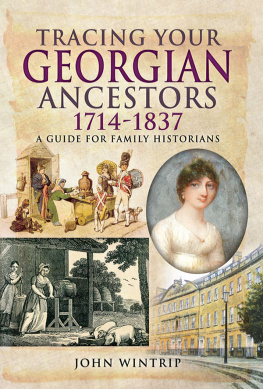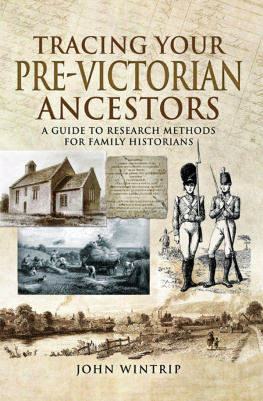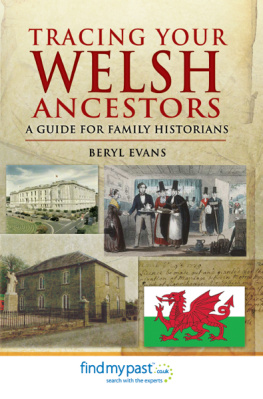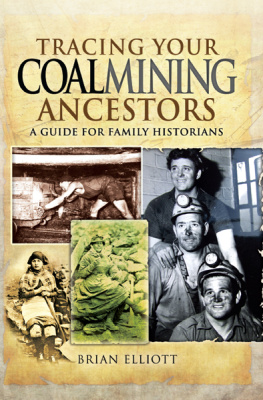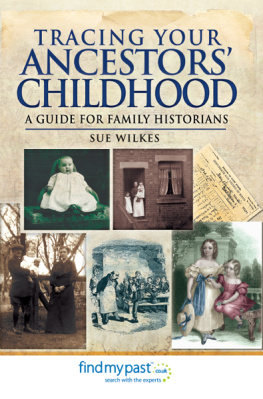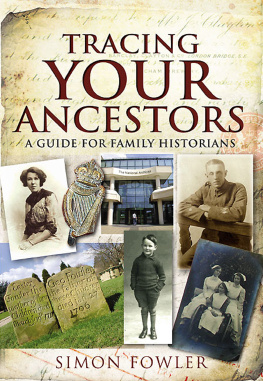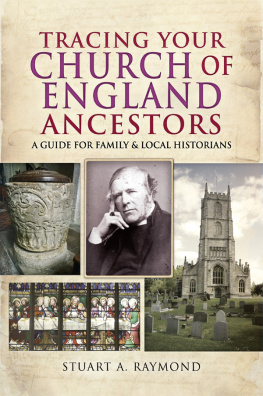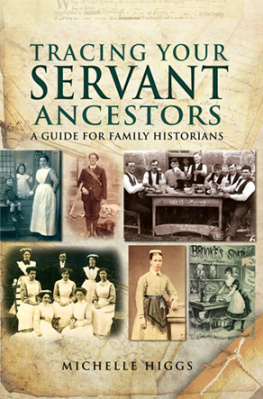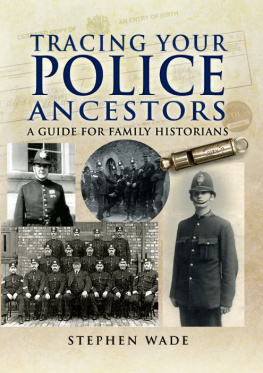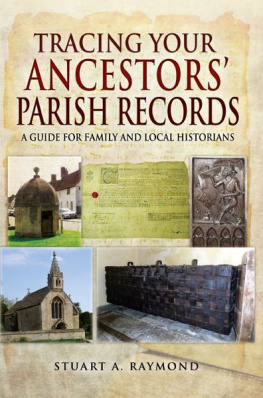
TRACING YOUR GEORGIAN ANCESTORS 17141837
The Family History Web Directory
Jonathan Scott
Tracing British Battalions on the Somme
Ray Westlake
Tracing Great War Ancestors
BHTV
Tracing History Through Title Deeds
Nat Alcock
Tracing Secret Service Ancestors
Phil Tomaselli
Tracing the Rifle
Ray Westlake
Tracing Your Air Force Ancestors
Phil Tomaselli
Tracing Your Ancestors
Simon Fowler
Tracing Your Ancestors from 1066 to 1837
Jonathan Oates
Tracing Your Ancestors Through Letters and Personal Writings
Ruth A Symes
Tracing Your Aristocratic Ancestors
Anthony Adolph
Tracing Your Army Ancestors
Simon Fowler
Tracing Your Army Ancestors - 2nd Edition
Simon Fowler
Tracing Your Army Ancestors - 3rd Edition
Simon Fowler
Tracing Your Birmingham Ancestors
Michael Sharpe, Michael Sharpe
Tracing Your Black Country Ancestors
Michael Pearson
Tracing Your Boer War Ancestors
Jane Marchese Robinson
Tracing Your Canal Ancestors
Sue Wilkes
Tracing Your Channel Islands Ancestors
Marie-Louise Backhurst
Tracing Your Criminal Ancestors
Stephen Wade
Tracing Your East Anglian Ancestors
Gill Blanchard
Tracing Your East End Ancestors
Jane Cox
Tracing Your First World War Ancestors
Simon Fowler
Tracing Your Glasgow Ancestors
Ian Maxwell
Tracing Your Great War Ancestors: The Gallipoli Campaign
Simon Fowler
Tracing Your Great War Ancestors: The Somme
Simon Fowler
Tracing Your Great War Ancestors: Ypres
Simon Fowler
Tracing Your Huguenot Ancestors
Kathy Chater
Tracing Your Jewish Ancestors
Rosemary Wenzerul
Tracing Your Jewish Ancestors - Second Edition
Rosemary Wenzerul
Tracing Your Labour Movement Ancestors
Mark Crail
Tracing Your Legal Ancestors
Stephen Wade
Tracing Your Liverpool Ancestors
Mike Royden
Tracing Your Liverpool Ancestors - Second Edition
Mike Royden
Tracing Your London Ancestors
Jonathan Oates
Tracing Your Medical Ancestors
Michelle Higgs
Tracing Your Merchant Navy Ancestors
Simon Wills
Tracing Your Northern Ancestors
Keith Gregson
Tracing Your Northern Irish Ancestors
Ian Maxwell
Tracing Your Pauper Ancestors
Robert Burlison
Tracing Your Police Ancestors
Stephen Wade
Tracing Your Pre-Victorian Ancestors
John Wintrip
Tracing Your Prisoner of War Ancestors: The First World War
Sarah Paterson
Tracing Your Railway Ancestors
Di Drummond
Tracing Your Royal Marine Ancestors
Richard Brooks, Richard Brooks and Matthew Little
Tracing Your Rural Ancestors
Jonathan Brown
Tracing Your Scottish Ancestors
Ian Maxwell
Tracing Your Second World War Ancestors
Phil Tomaselli
Tracing Your Servant Ancestors
Michelle Higgs
Tracing Your Service Women Ancestors
Mary Ingham
Tracing Your Shipbuilding Ancestors
Anthony Burton
Tracing Your Tank Ancestors
Janice Tait, David Fletcher
Tracing Your Textile Ancestors
Vivien Teasdale
Tracing Your Twentieth-Century Ancestors
Karen Bali
Tracing Your Welsh Ancestors
Beryl Evans
Tracing Your West Country Ancestors
Kirsty Gray
Tracing Your Yorkshire Ancestors
Rachel Bellerby
Your Irish Ancestors
Ian Maxwell
TRACING YOUR GEORGIAN ANCESTORS 17141837
A Guide for Family Historians
John Wintrip
First published in Great Britain in 2018 by
PEN & SWORD FAMILY HISTORY
an imprint of Pen & Sword Books Ltd
47 Church Street
Barnsley
South Yorkshire
S70 2AS
Copyright John Wintrip 2018
ISBN 978 1 52670 422 1
eISBN 978 1 52670 424 5
Mobi ISBN 978 152670 423 8
The right of John Wintrip to be identified as the Author of this Work has been asserted by him in accordance with the Copyright, Designs and Patents Act 1988.
A CIP catalogue record for this book is available from the British Library
All rights reserved. No part of this book may be reproduced or transmitted in any form or by any means, electronic or mechanical including photocopying, recording or by any information storage and retrieval system, without permission from the Publisher in writing.
Pen & Sword Books Ltd incorporates the imprints of Pen & Sword Archaeology, Atlas, Aviation, Battleground, Discovery, Family History, History, Maritime, Military, Naval, Politics, Railways, Select, Social History, Transport, True Crime, and Claymore Press, Frontline Books, Leo Cooper, Praetorian Press, Remember When, Seaforth Publishing and Wharncliffe.
For a complete list of Pen & Sword titles please contact
PEN & SWORD BOOKS LIMITED
47 Church Street, Barnsley, South Yorkshire, S70 2AS, England
E-mail:
Website: www.pen-and-sword.co.uk
ACKNOWLEDGEMENTS
I would like to express my thanks to all my previous clients, who collectively have given me the opportunity to examine a far wider range of sources while researching their ancestors than would have been possible through personal research alone. I am also grateful to the staff of the large number of archives throughout the country where I have carried out both personal and professional research over many years. I would particularly like to register my gratitude to Jacky Casson, Karen Cummings, Judy Lester and Malcolm McEachran for reading through drafts of the text and making valuable suggestions. Finally, I would like to thank my wife Jessica for her constant support and encouragement while I was writing this book. vi
ABBREVIATIONS
The following abbreviations have been used throughout this book:
GRO General Register Office
LDS Church of Jesus Christ of Latter-day Saints (Mormons)
TNA The National Archives
INTRODUCTION
Over two decades ago, as a relatively inexperienced researcher, I searched in vain for a book that focused specifically on research in the period immediately before civil registration. In the continuing absence of such a book, and after several years as a professional genealogist, I began to think about writing one myself. I subsequently came to the conclusion that two complementary but self-contained books might be more appropriate: one would describe the sources, and the other, aimed at more experienced researchers, would concentrate on research methods. As so little had been written on research methods, I decided to write that book first. Tracing Your Pre-Victorian Ancestors: A Guide to Research Methods for Family Historians was published by Pen & Sword in February 2017. I then turned my attention to the present book.
The aim of this book is to describe the sources available for researching ancestors in Georgian England. The period defined as the Georgian era is often considered to include the short reign of William IV, who died only a few days before civil registration was introduced in 1837. This definition is particularly apt in the context of family history research, and has therefore been used in the context of this book.
The genealogical sources surviving from the Georgian era are essentially the same as they were many decades ago, but what has changed, and has been increasing rapidly in recent years, is the availability of online search tools and digital images of sources. Online resources can enable research to be accomplished in hours that would previously have taken months or years, but the material available online represents only the tip of the iceberg, the size of which is dependent on the area of the country in which research is being carried out and specific characteristics of the individuals and families being investigated. Overcoming brick walls before 1837 often requires using sources that are only available in archives. Researchers are more likely to be able to find information about their ancestors by first identifying appropriate sources and then establishing how they can access them, rather than the other way around. Focusing only on sources available online, or only on those held in a conveniently located local archive, can result in significant information not being found.
Next page
